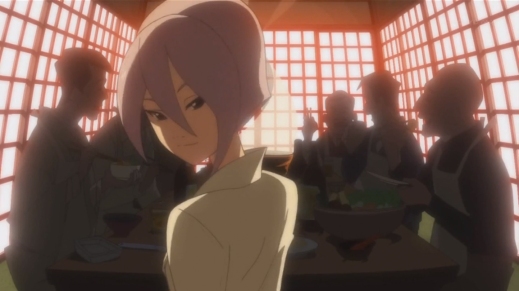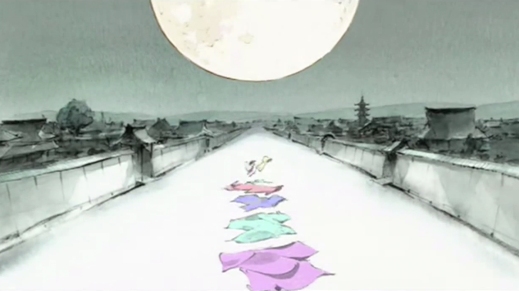REVIEW: The Severing Crime Edge (2013)

by Dustin Kramer
The Severing Crime Edge, based on a manga by Tatsuhiko Hikagi and directed by Yuji Yamaguchi, tells the story of Kiri Haimura, a young man with a desire to cut hair so intensely insatiable it would make Raymond Bessone put down his golden shears and take a job at Supercuts. After his family has had enough of his hobby/obsession, Kiri is lucky enough to stumble upon 14-year-old Iwai Mushanokouji. Iwai seems like a normal enough girl until you learn that she is cursed with floor-length hair that can never be cut. As luck would have it, Kiri’s flamboyant scissors are also cursed … with the ability to cut anything. It’s a match made in heaven–that is until psychopathic murderers start coming after poor, innocent Iwai. You see, Iwai is what’s called the “Hair Queen,” and anyone who manages to kill this helplessly hairy teenager will have their heart’s deepest desire granted to them. The would-be murderers are known as Authors, their tools of the trade: Killing Goods. Kiri’s magic blades just so happen to be one of these famed weapons, passed down to him from his ancestor Grayland, a man allegedly responsible for some 200 deaths. The scissors even have a name: The Severing Crime Edge. Can Kiri protect Iwai from the so-called Authors, their Killing Goods, and a lifetime of bad hair days? Let’s find out.
REVIEW: The Eccentric Family (2013)

by Dustin Kramer
As I sit here and try to think about what Masayuki Yoshihara’s The Eccentric Family has to say, I find myself profoundly inept at finding a fitting focal point for this introduction. It would be a disservice to say the 13-episode adaptation of Morimi Tomihiko’s novel is purely about the importance of family, because its scope feels so much wider than that. However, I hesitate to claim that its central themes examine the meaning of life itself, a concept so large and overdone that it implies pretension–something that this story truly has none of. But to denounce both of these examinations is equally dishonest, because this animated drama has plenty to say in each arena and much more.
REVIEW: Gatchaman Crowds (2013)

by Dustin Kramer
Isn’t the Internet great? Think of all the things we can do with it–sharing, communicating, manifesting our digital selves in the physical world to deal with crime and natural disaster recovery. Wait, we can’t do that last one? Well, if we can’t by 2015, we’ve been scammed (I also want my hover board and Mr. Fusion, please and thank you). But imagine if we could actually eliminate the need for central authority by using cyberspace to self-govern. Could it really work? Gatchaman Crowds attempts to answer this question and a few others. Let’s dive in.
GALLERY: AnimeJapan 2014

by Dustin Kramer
Ah, the wonderful weariness of convention fatigue. Having just returned home from my fifth anime-related event in Japan, I realize I’ve come to enjoy the icky self-debriefing process from a day-long sensory overload of sweet, new media. I’ve got 90 pictures to share from the day’s festivities, and the moment I click “publish,” I’ll be off to take the best shower I’ve had all year. (I won’t be sharing pictures of my bathing ritual, however.)
REVIEW: The Sensualist (1991)

by Dustin Kramer
The Sensualist is a 1991 animated film from Studio Grouper based on The Life of an Amorous Man, the 17th century novel by Ihara Saikaku. The movie should presumably tell the story of Yonosuke, a clothing store proprietor and titular amorous man. However, the film’s actual narrative has little to do with Yonosuke but rather a foolish tailor by the name of Juzo. You see, Juzo is in a bit of a pinch. He made a silly bet with some jerk-off that he could sleep with famed courtesan Komurasaki at their premier meeting, so now he’s off toward the capital city of Edo to make good on his wager. Problem is, Komurasaki is a very classy lady and doesn’t just invite any old joker into her futon. In fact, she doesn’t serve working class patrons at all, and even if she did, she doesn’t kiss on the first date. Like I said, a very classy lady. It looks like Juzo’s going to lose his bet, so what’s on the line anyway?
Not much–just his penis.
REVIEW: Kaguya-hime no Monogatari (2013)

by Dustin Kramer
I’m conflicted about folktales. What began as bits and pieces of oral literature, before someone had the good sense to put them to paper, are owed some amount of respect for being among the first stories that humans told. However, so many of the principles that we consider essential to the telling of a “good story” were developed — and are still developing — many generations after the birth of these yarns. Ancient storytellers didn’t have the benefit of thousands of years of literature to lend them a detailed understanding of structure, character development, conflict, or how to make these elements compelling. I don’t mean to be so hard on the awkward adolescence of modern literature, but folktales tend to be pretty bad stories. The process of adaptation can inject modern storytelling sensibilities into an otherwise crappy narrative, but in the case of the 2013 Studio Ghibli film Kaguya-hime no Monogatari (The Story of Princess Kaguya) filmmaker Isao Takahata was unable to give this fable the contemporary touch it needs.
REVIEW: Eternal Family (1997)

by Dustin Kramer
The opening text crawl of Koji Morimoto’s Eternal Family tells us about six strangers who have been gathered together, had their memories erased, and convinced they are a family. The reason? Science, natch. But in order to pay for the experiment’s operating costs, the scientists sell the surreptitiously recorded footage of the fake fam to a television broadcasting company. The ensuing reality series is a huge hit, and these six deeply disturbed people become stars ignorant of their own celebrity.
REVIEW: Genius Party (2007)

by Dustin Kramer
When it comes to analyzing anthology films, there is always the question of how to approach them. Should each entry be examined based on its own merits, or should the collection be discussed as a singular entity? In short film anthologies where multiple filmmakers are gathered to create pieces under a unifying theme or idea, one should expect that each work will vary greatly in narrative, tone, style, and even the artists’ personal interpretations of that coalescing concept. This encourages the analyst to consider the entries independently. But then what is the point of gathering them under a common banner? Is it simply for convenient consumption? In this piece I will take a look at Studio 4°C’s presumptuously titled Genius Party, a collection of seven animated shorts by Japanese filmmakers, and ponder whether its entries need to be seen as an undivided unit or if they are better cherry-picked from the lot and enjoyed as standalone projects.
REVIEW: The Wind Rises (2013)

by Dustin Kramer
Art is personal. Creative self-expression is, by its very nature, a process of externalizing the internal. Many of your favorite movies, music records, and books were labors of love. But is there a point at which one’s art can become too personal? Can dedication and focus breed myopia? In examining Hayao Miyazaki’s latest film, I may have found the answer.
REVIEW: A Letter to Momo (2011)

by Dustin Kramer
In a narrative, most human emotions are generally considered universal constructs. No one has trouble recognizing when a story is trying to make you sad or happy or uncomfortable. But not all elicitations are so cut-and-dry. When dealing with the topic of grief, storytellers have their work cut out for them. Creating a world in which characters can believably exist and grow is hard enough, but handling one of the most trying and subjective of human emotions can complicate what could otherwise be more or less emotionally ubiquitous. While I love more abstruse takes on the subject — Lars von Trier’s Antichrist or Darren Aronofsky’s The Fountain, for example — there’s something extremely satisfying about the deft handling of the theme in a family film. Seven years in the making, Hiroyuki Okiura’s A Letter to Momo is one such film.
